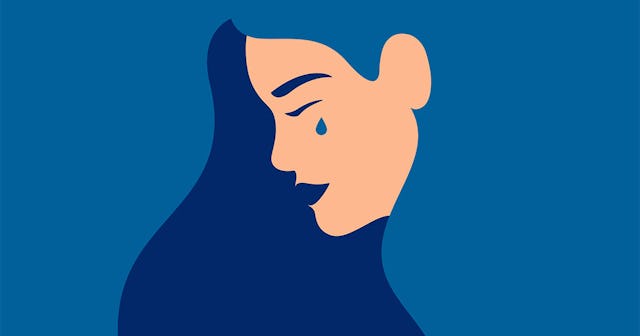6 Common Misconceptions About Grief

My husband died on February 3, 2018 at 9:37 p.m. after a horrific and not very long battle with brain cancer. He died, and the support beams holding up the world crumbled. Every single thing I thought I knew about the order of the universe was dismantled in the space between a breath that was and then wasn’t.
In that moment, I joined the world of the grievers. Though, by all accounts, I’d been grieving him for a while. Brain cancer had taken all the parts that made him “him” long before it took his breath. But taking his breath was the line that hurled me definitively into grief.
It’s been three years and I’m still trying to wrap my head around the word grief: what it means, what it feels like, what it looks like. Often, it’s my expectations that are at odds with the reality.
Before becoming a griever, I believed certain things about grief and life after loss, mostly from what I’d seen in movies and television shows, somewhat from what I’d gathered through mainstream discussions on grief. Since becoming a griever, I’ve come to realize grief is largely misunderstood. That’s beginning to change, but some misconceptions persist.
Misconception: Grief Is A Single Emotion
When I thought of grief before, I thought of a person crying at the funeral. I thought of a person wearing black for a few weeks. I thought grief could be summarized as big sadness. But that’s wrong. Grief isn’t just big sadness. It’s sadness and anger and anxiety and heartache and longing and nostalgia and hope all wrapped into one word. It’s often all of that at once.
Misconception: Grief Is Singular
From the outside looking in, grief may look singular, meaning it looks focused on a single loss. It’s so rarely that. Grief is so rarely one dimensional. Yes, I’m grieving the loss of my husband and all the things he was to me (best friend, co-parent, confidant), but I’m also grieving the loss of our future, of my sense of safety in the universe, of the person I was before I heard the word cancer, of my children’s innocence, of so much more.
Misconception: Grief Won’t Change Your Relationships
Grief upends “normal” forever. You’re always in your new normal, which means your relationships will never go back to normal.
After loss, you’re different. Your entire world is different. A natural consequence of that is that your relationships are different. There will be those who don’t understand who you are now. There will be those who do. In a cruel twist of fate, there will be those who leave when you were sure they’d stay, and those who show up when you least expect it.
Misconception: Grief Has An Expiration Date Or Time Heals All Wounds
The cruelest realization about grief came on February 3, 2019—Super Bowl Sunday and the end of my first year as a griever. That day, I realized I have to do the whole year again without my husband. February 3, 2019 began the year of seconds, and it didn’t feel easier. My grief wasn’t magically gone after a year.
Grief is a hole. It’s a hollowness. With time, that hole doesn’t shrink, but life does grow around it. Sometimes, so much life grows around it, it looks smaller from a distance. Sometimes, the wind blows the wrong way and the life growing around the hole shifts, and that hole seems to be all that’s left. The wind will blow back, eventually, to make the hole look smaller. The only certainty is that the hole will not disappear.
Misconception: Grief Is Linear
Most people have probably heard of the five stages of grief. I’ve heard the concept, but I couldn’t name all five stages or tell you the order in which they come. I know acceptance is supposed to be last, but it didn’t go that way for me. I accepted my grief long before I dealt with my anger. (That anger hit just about at the three year mark and it was a rage like none I’ve never felt before.) Because grief isn’t linear. It’s a roller coaster that doubles back on itself and plummets and takes a sharp right and then a sharp left, all while you thought you were nearing the end of the ride.
Misconception: If You’ve Found A New Partner (Had A New Baby, Made A New Friend, Etc.), Your Grief Is Over
Of all the misconceptions about grief, this misconception hits where it most hurts. It minimizes grief. It reduces the person we lost to a role that can be replaced — husband, partner, child, best friend — and ignores all the things that they were. The person we are grieving is gone. Whoever has come into our lives after the fact, even if they fill a role, is not a replacement. The grief is still there. That hole is there. A new person just means that the life around the hole has grown a little bigger. The reality is that both then coexist — joy of this new person and despair over that loss and that never-to-be-future.
Before February 3, 2018, I didn’t understand grief. I didn’t understand living with a hole, how that hole never goes away. The sad truth about grief that you can only truly understand grief once you’re in it, once you’ve had the loss.
But once you know it, you also know this: understanding grief means understanding love and hope in a way that can sometimes make even the darkest moments shimmer.
This article was originally published on